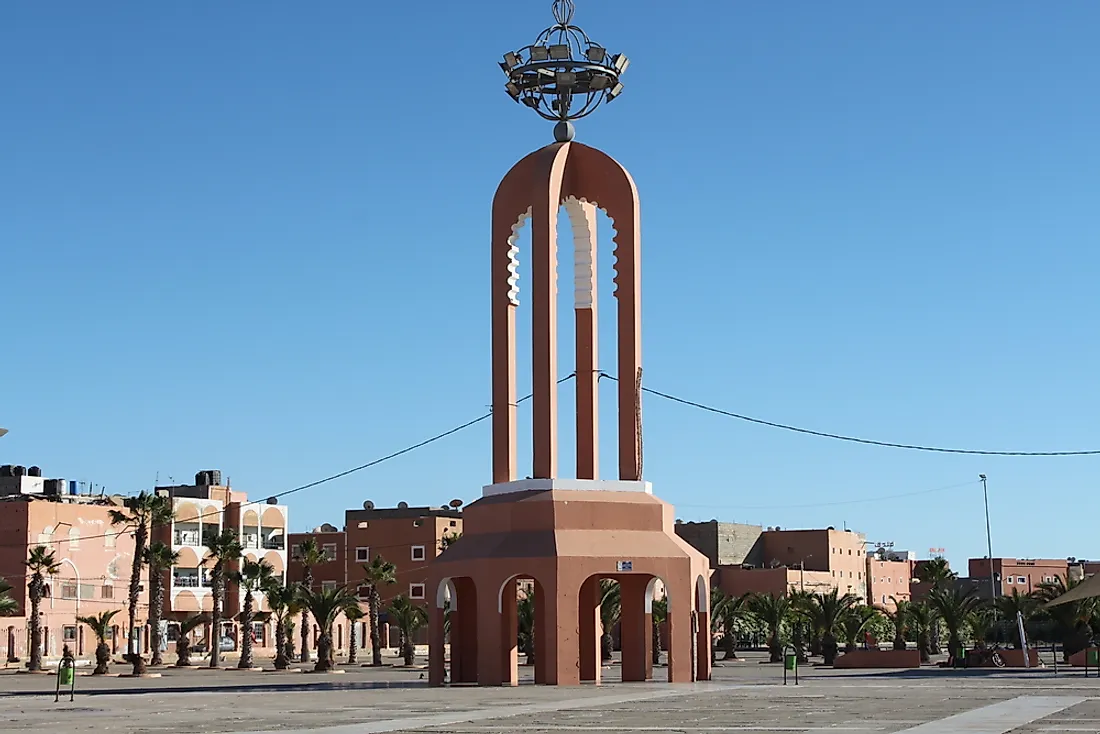What Is the Capital of Western Sahara?

Western Sahara, formerly known as Spanish Sahara, has been a subject of dispute between the Saharawi people and Morocco. The territory is located in the Maghreb region of North Africa, bordered to the northeast by Algeria, east and south by Mauritania, and to the north by Morocco proper. Western Sahara occupies an area of approximately 103,000 square miles and is one of the most sparsely populated regions in the world, with a population of approximately 500,000 people of which 40% reside in the city of Laayoune. A 16-year long dispute over Western Sahara was ended with a UN-peace deal in 1991 with a promise of a referendum on the independence of the territory which is yet to take place. Currently, most governments recognize the Sahrawi Arab Democratic Republic which is a full member of the African Union. Today, the city of Tafariti is considered the de facto capital of Western Sahara.
The Capital of Western Sahara
Western Sahara has had two capital cities in its history; Tifariti and Laayoune. Laayoune was designated the capital of Spanish Sahara in 1940 by the Spanish. It is the largest and the most populous city in the region of Western Sahara, accounting for approximately 40% of the population. Laayoune was founded in 1938 by Antonio de Oro, a Spanish explorer. However, it is currently the capital of Laayoune-Sakia El Hamra, one of Morocco's 12 regions. The city is administered by Morocco under the supervision of the United Nations peacekeeping mission. The de facto capital city of Western Sahara is Tafariti. It has been the capital of the region since 2011 and is the headquarters of the 2nd military region of the SADR.
Tifariti
Tifariti is located in the northwestern region of Western Sahara, approximately 9 miles from Mauritania and 86 miles from Smara. The city is part of what Morocco calls the “Buffer Zone” while Polisario Front refers to it as “Liberated Territory.” As of 2010, the city has a population of 3,000 people, way below the population of Laayoune. Tifariti houses government quarters, SADR’s parliament, museum, hospital, school, and a mosque.
History of Tifariti
Tifariti was originally a temporary nomadic camp situated near an oasis and a seasonal town for the Sahrawi people who have dominated the region since medieval period. The Spanish later settled in the area and used it as a military camp. The town was largely abandoned by its population in 1976 because of the war with Morocco. Tifariti has been a place of many battles, especially during the Western Sahara War. It was used as a military camp by both sides at different points of the war. The town was bombed severally by Royal Moroccan Air Force in August 1991, just days before the proclamation of the ceasefire, destroying most of the buildings. Now, the town is under reconstruction.
Infrastructure
Because of the unfavorable climate and political instability the region, Tifariti is not a preferred destination. The town has a few administrative buildings and a hospital. Most of the buildings constructed between 1989 and 1991 through foreign aid in preparation for a referendum and return of Sahrawi refugees were destroyed by the Royal Moroccan Air Force in 1991. Since the proclamation of the ceasefire, the government has continuously worked at establishing and improving the infrastructure.











